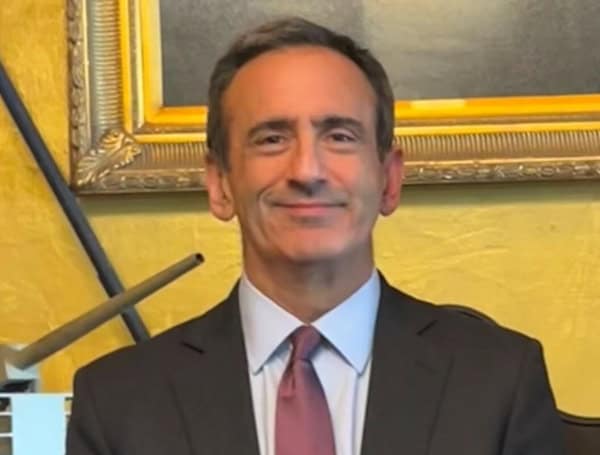Senator Tom Cotton (R-Arkansas) has issued a second letter to Vice President Kamala Harris, voicing concerns about her National Security Advisor, Philip Gordon, and his links to Ariane Tabatabai, a senior Department of Defense official allegedly involved in activities to increase Iran’s influence in the United States.
“Since my last letter, Mr. Gordon’s social media activity has continued to exhibit a clear anti-Israel bias that aligns with Iranian interests. His public criticisms of Israel raise serious concerns about the advice he may be providing you privately,” said Cotton.
“I recognize the challenge in distinguishing between Iranian agents and the prevalent left-wing ideologies among your staff. However, it is imperative that you make these tough distinctions and rigorously vet those you appoint to significant and trusted positions,” he said.
Read: DNC Platform Vows To End ‘Dark Money’ As Dems Raise Hundreds Of Millions In The Shadows
Philip H. Gordon currently serves as the National Security Adviser to the Vice President of the United States.
His previous roles include being the Mary and David Boies Senior Fellow in U.S. Foreign Policy at the Council on Foreign Relations.
Gordon has also held significant positions within the government, such as the White House Coordinator for the Middle East and Assistant Secretary of State for European and Eurasian Affairs during the Obama administration.
Ariane Tabatabai is an Iranian-American scholar, writer, and policy advisor. She is recognized for her expertise in political science, particularly focusing on security studies and Middle Eastern affairs.
Read: Rep. Debbie Dingell Says She’s ‘Not On The Sugar High’ Over Harris Winning Michigan In 2024 Election
Here are some key points about her:
- Education: She holds a graduate degree from King’s College London.
- Career:
- She has served as a senior policy advisor to the United States Department of Defense.
- She’s held academic positions at Georgetown University, teaching security studies.
- She has worked as a researcher for the RAND Corporation.
- She’s been involved with NATO and the German Marshall Fund of the United States.
- Focus Areas: Her research and writing primarily delve into Iran’s foreign and security policies, nuclear proliferation, and regional dynamics in the Middle East.
On Iran:
- Nuclear Program: She believes that while Iran’s nuclear ambitions are concerning, a military strike is not the solution. Instead, she advocates for a combination of diplomacy, sanctions, and regional security cooperation to address the issue.
- Domestic Politics: She highlights the complexities of Iran’s internal politics, including the power struggle between various factions and the increasing frustration of the population due to economic hardship and social restrictions.
- Foreign Policy: She argues that Iran’s foreign policy is driven by a combination of security concerns, ideological motivations, and a desire to preserve its regional influence. She emphasizes the importance of understanding these motivations to develop effective policies towards Iran.
Read: U.S.-Iranian National In California Arrested For Trying To Send Military Aircraft Parts To Iran
On U.S.-Iran Relations:
- Engagement vs. Confrontation: She supports a diplomatic approach towards Iran, even though she acknowledges the challenges and limitations of such an approach. She criticizes the “maximum pressure” strategy adopted by the Trump administration, arguing that it has backfired and pushed Iran further into a corner.
- Nuclear Deal: She views the Iran nuclear deal (JCPOA) as a flawed but necessary agreement that should be revived and built upon. She believes that it provides a framework for addressing Iran’s nuclear program and can serve as a starting point for broader diplomatic engagement.
Read: US Forces Neutralize Houthi Drone Threat In Yemen
On Regional Security:
- U.S. Role: She emphasizes the importance of U.S. leadership and engagement in the Middle East, even though she acknowledges the need for a more balanced and sustainable approach. She advocates for working with allies and partners to address regional challenges, such as the conflict in Yemen and the rise of extremist groups.
- Iran’s Regional Influence: She sees Iran as a major player in the region, but also emphasizes the importance of not exaggerating its capabilities and influence. She argues that Iran’s regional activities are often a reaction to perceived threats and vulnerabilities, and that addressing these underlying concerns can lead to a more stable regional order.
It’s worth noting that Tabatabai’s views have been subject to debate and controversy, especially regarding her stance on the Iran nuclear deal and her engagement with Iranian officials. However, her expertise and insights on Iran and Middle Eastern security issues are widely recognized and contribute significantly to the ongoing policy discussions in these areas.
Please make a small donation to the Tampa Free Press to help sustain independent journalism. Your contribution enables us to continue delivering high-quality, local, and national news coverage.
Android Users: Download our free app to stay up-to-date on the latest news.
Connect with us: Follow the Tampa Free Press on Facebook and Twitter for breaking news and updates.
Sign up: Subscribe to our free newsletter for a curated selection of top stories delivered straight to your inbox.

